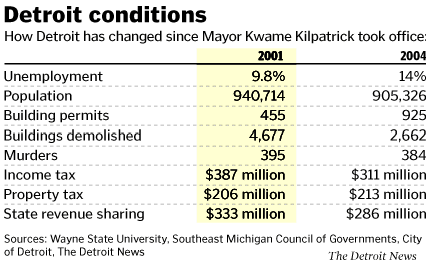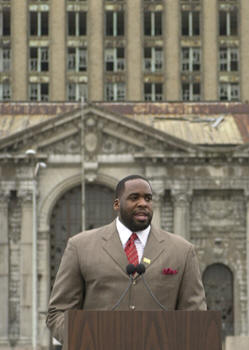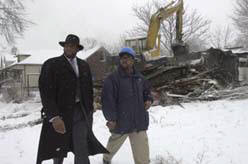|
FOBIA Friends of Belle Isle Aquarium
Detroit mayor seeks to rejuvenate financial rescue plan as threat of insolvency looms.
DETROIT -- With insolvency looming, Detroit Mayor Kwame Kilpatrick on Tuesday will deliver his fourth State of the City address -- a speech aimed at rejuvenating a fiscal rescue plan that some experts fear is stalling. The city is grappling with a $389 million budget shortfall this fiscal year and the next, many of the first-term mayor's most important goals remain unmet, and resistance is growing to some critical proposals to cut spending. The city's auditors shortly will issue a report warning that the administration isn't responding quickly enough to the threat of state-sponsored emergency financial manager. And the first-term mayor faces what promises to be a bruising re-election campaign this summer and fall. Many residents are growing impatient. "It seems like he's only making matters worse," says Kendra Rouse, 28, a single mother of two who was laid off this month from the Recreation Department. "I don't like the way he's handling the issues, and now he's saying he can make it right to stay in office." The mayor's defenders say he needs more time and cooperation. But some residents, officials and analysts question whether the young mayor -- who is more often in the news for controversies involving his inner circle than for achievements -- will be able to meet the growing challenges. Among the most severe is matching the size of the government to the size of the city. Earl M. Ryan, president of the Citizens Research Council of Michigan, a nonpartisan research organization, says the city has more workers per capita than Los Angeles, Dallas and Chicago and will need to cut about 3,500 people from its work force of about 18,000. Payroll consumes 38 percent of the city's $1.9 billion budget. "It seems to us that there's room in the budget to make significant reductions," Ryan says. "It's not going to be easy or painless, but it is questionable in a city with fairly high taxes whether they can continue to provide that level of service." The city's auditor general, Joe Harris, is expected to release a critical assessment of the city's finances next month. He warns that unless the administration cleans up management problems, the city will "lose its future" to a state-appointed financial manager. "I don't see the mayor addressing fundamental problems that would begin to cause a turnaround," says Harris, who ran for mayor four years ago. State Sen. Buzz Thomas, a Kilpatrick ally, disagrees. He says Detroit isn't at the point of default. Rather, he said the problem is "forcing us to have a frank discussion." Nevertheless, the contrast between the city and the rest of Metro Detroit remains stark. A study released last month by the Brookings Institution, a Washington research group, listed the Detroit metropolitan area as having one of the highest levels of mismatch between blacks and job development, meaning that African-Americans, who generally live in urban neighborhoods, are extremely isolated from the region's jobs. That has tended to magnify fundamental economic problems hurting Michigan. Detroit's Chief Financial Officer Sean Werdlow says Michigan's stale economy has aggravated the city's financial situation for the past three years, contributing to weakness in income and property tax receipts. Werdlow says the state is also contributing $50 million less this year in revenue sharing, while health care and pension costs are expected to rise 15 percent. Kilpatrick estimates the city has lost more than $100 million in state revenue sharing during the past three years. "We're getting double hits and it's grown progressively worse since we've been in office," Werdlow says. In January, the mayor announced five short-term remedies, three of which have not been met. The Kilpatrick administration has completed 546 of 686 planned layoffs, and the mayor has cut administrative salaries by 10 percent. But City Council has yet to approve a 10 percent cut for nonunion employees, unions haven't agreed to a 10 percent wage reduction and only a fraction of contractors have agreed to price concessions. The city last month mailed letters asking contractors to take a 10 percent cut. Of 1,000 letters mailed, Werdlow says only 75 contractors have agreed. The mayor initially said he wanted to adopt cigarette and liquor taxes, but has shelved the idea because it would require approval by a reluctant state Legislature. But Kilpatrick says he would still pursue a 2 percent tax on prepared food, as well as a property transfer tax, because it would only require a local vote. Revised bus schedules are also expected to save the city $25 million by next summer. But Harris has suggested the city's transportation department has the potential to save $40 million a year by further streamlining its operations. The auditor general also has urged the city to adopt a risk management plan -- a set of standard procedures aimed at limiting problems and mistakes that could contain unnecessary liability lawsuit payments. Those currently cost taxpayers between $50 million and $70 million a year. Kilpatrick also must show on Tuesday that he's in command of the situation. When he took office, he was handed a $75 million deficit. Next fiscal year's shortfall is projected at $231 million. "The perception over the last three years is that things have gotten worse," says political analyst Sam Riddle. "He has to be brutally honest (in his speech) -- and it has to be something more than flowery promises." Many residents will expect new words on job development -- a critical area as the prospect of widespread layoffs of city employees add to the general employment malaise. The city is attempting to partner with local businesses to retrain former city employees. But 28-year-old Nakiba Hunt, a Detroiter who lost her clerical job in the assessor's office, says Kilpatrick was ill-prepared to answer questions when he met laid-off workers. "What did you come here for if you don't have any information?" Hunt asked. Rouse, who lost her $11.42-an-hour job as a building attendant at the Evans Recreation Center, says she is not sure how she will meet a mortgage payment, her car note and insurance. "I'm just trying to stay strong for my kids because I don't want them to see me break down and I don't want to lose what I've accomplished," Rouse says. There are bright spots. The downtown area is being spruced up for Super Bowl XL, which will take place in February 2006. The mayor can tout a new city blight court that can act more directly to fix responsibility for decayed properties, and there are more than 600 new residential units under way. But other key economic development projects are delayed, frequently through no fault of the city administration. For example, Kilpatrick declared in his 2002 and 2003 State of the City speeches that the construction of permanent casinos would provide thousands of jobs. But those projects are stalled in court battles and depend heavily on how the gambling market continues to develop in the region. Kilpatrick's promise of a new police headquarters building in his 2003 State of the City address was delayed by the U.S. Justice Department's intervention in reforming the police department, officials say. The administration settled on salvaging the long-vacant Michigan Central Train Depot just west of downtown, owned by Ambassador Bridge businessman Manuel Maroun, but city officials have said the building won't be ready until late 2006 or early 2007. And despite his push to expand Cobo Center, critics continue to resist using public money for the project. Oakland County Executive L. Brooks Patterson has said he will resist any new tax to help pay for an expansion. The stalled projects and lost revenues provide a stark contrast to the hope and optimism Kilpatrick radiated during at his inauguration, when he encouraged Metro Detroiters to take their kids to Belle Isle. Under his first term, the park's zoo is empty and the aquarium is set to close April 3.
You can reach Judy Lin at (313) 222-2072 or jlin@detnews.com.
|



